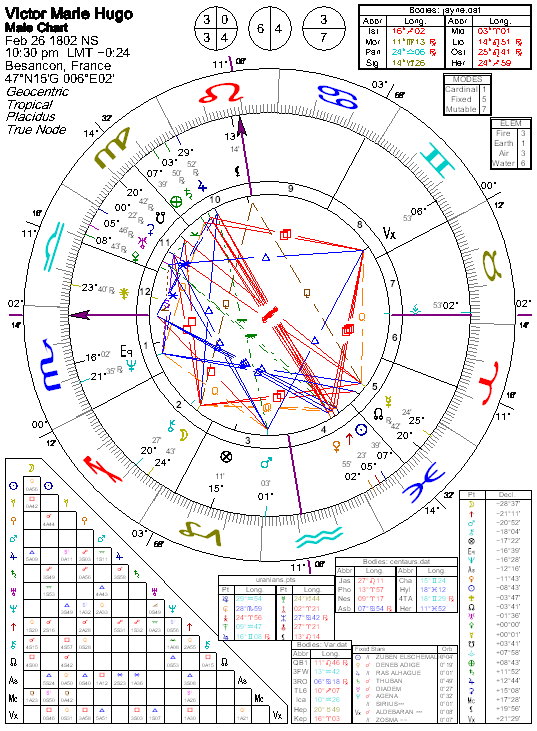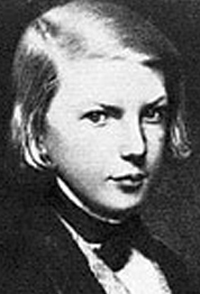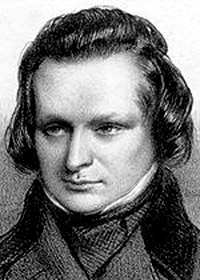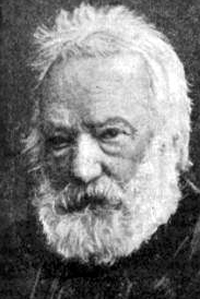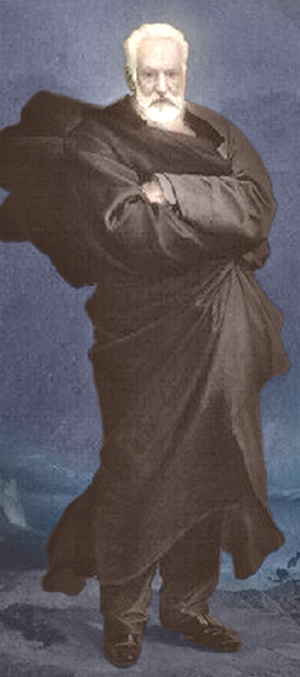Victor Marie Hugo
Copyright Michael D. Robbins 2005
Astro-Rayological
Interpretation & Charts
Quotes
Biography
Iimages and Physiognomic Interpretations
Victor Marie Hugo—Novelist
(1802-1885) February 26, 1802, Besancon, France, 10:30 PM, LMT. (Source: Notable Nativities and Sabian Symbols. Also LMR cites Gauquelin’s Volume 6/423) Died of the general disability of old age and pneumonia on May 22, 1885, Paris, France, at 1:27 PM.
(Ascendant, Scorpio with Neptune also in Scorpio; Sun, Venus and Pluto conjuncted in Pisces; Mercury also in Pisces; Moon in Sagittarius; Mars in Aquarius; Jupiter in Leo conjunct Saturn; Saturn in Virgo; Uranus in Libra)
(Study this Life) French poet, dramatist, novelist, essayist, and critic; a many-sided genius. Hard working, politically active, and humanitarian. He woks includes the play Lucrezia Borgia (1833) The Hunchback of Notre Dame (1831), and Lesw Miserables (1862)
Piscean compassion demonstrated in the social philosophy of his novels. The ability to detect and attach corruption and abuse (and his psychological acuity as well)
The most prolific French writer of the nineteenth century, Hugo was later elected to the Legislative Assembly, but fled after the coup in 1851.
A compliment is something like a kiss through a veil.
A faith is a necessity to a man. Woe to him who believes in nothing.
A library implies an act of faith.
A man is not idle because he is absorbed in thought. There is a visible labor and there is an invisible labor.
A saint addicted to excessive self-abnegation is a dangerous associate; he may infect you with poverty, and a stiffening of those joints which are needed for advancement - in a word, with more renunciation than you care for - and so you flee the contagion.
Adversity makes men, and prosperity makes monsters.
All the forces in the world are not so powerful as an idea whose time has come.
An intelligent hell would be better than a stupid paradise.
An invasion of armies can be resisted, but not an idea whose time has come.
Architecture has recorded the great ideas of the human race. Not only every religious symbol, but every human thought has its page in that vast book.
As the purse is emptied, the heart is filled.
At the shrine of friendship never say die, let the wine of friendship never run dry.
Be as a bird perched on a frail branch that she feels bending beneath her, still she sings away all the same, knowing she has wings.
Be like the bird that, passing on her flight awhile on boughs too slight, feels them give way beneath her, and yet sings, knowing that she hath wings.
But when ill indeed, Even dismissing the doctor don't always succeed.
Certain thoughts are prayers. There are moments when, whatever be the attitude of the body, the soul is on its knees.
Civil war? What does that mean? Is there any foreign war? Isn't every war fought between men, between brothers?
Close by the Rights of Man, at the least set beside them, are the Rights of the Spirit.
Common sense is in spite of, not as the result of education.
Curiosity is one of the forms of feminine bravery.
Each man should frame life so that at some future hour fact and his dreaming meet.
Everything being a constant carnival, there is no carnival left.
Fashions have done more harm than revolutions.
Forty is the old age of youth; fifty the youth of old age.
Genius is a promontory jutting out into the infinite.
Great perils have this beauty, that they bring to light the fraternity of strangers.
Greater than the tread of mighty armies is an idea whose time has come.
Habit is the nursery of errors.
Have courage for the great sorrows of life and patience for the small ones; and when you have laboriously accomplished your daily task, go to sleep in peace.
Have no fear of robbers or murderers. They are external dangers, petty dangers. We should fear ourselves. Prejudices are the real robbers; vices the real murders. The great dangers are within us. Why worry about what threatens our heads or purses? Let us think instead of what threatens our souls.
He who opens a school door, closes a prison.
He, who every morning plans the transactions of the day, and follows that plan, carries a thread that will guide him through a labyrinth of the most busy life.
Hell is an outrage on humanity. When you tell me that your deity made you in his image, I reply that he must have been very ugly.
Hope is the word which God has written on the brow of every man.
How did it happen that their lips came together? How does it happen that birds sing, that snow melts, that the rose unfolds, that the dawn whitens behind the stark shapes of trees on the quivering summit of the hill? A kiss, and all was said.
Human intelligence discovered a way of perpetuating itself, one not only more durable and more resistant than architecture, but also simpler and easier.
I don't mind what Congress does, as long as they don't do it in the streets and frighten the horses.
I met in the street a very poor young man who was in love. His hat was old, his coat worn, his cloak was out at the elbows, the water passed through his shoes, - and the stars through his soul.
Indigestion is charged by God with enforcing morality on the stomach.
Initiative is doing the right thing without being told.
"Is there no hope?" the sick man said, The silent doctor shook his head, And took his leave with signs of sorrow, Despairing of his fee to-morrow.
It is from books that wise people derive consolation in the troubles of life.
It seemed to be a necessary ritual that he should prepare himself for sleep by meditating under the solemnity of the night sky... a mysterious transaction between the infinity of the soul and the infinity of the universe. Joy's smile is much closer to tears than laughter.
Laughter is the sun that drives winter from the human face.
Liberation is not deliverance.
Life is the flower for which love is the honey.
Mankind is not a circle with a single center but an ellipse with two focal points of which facts are one and ideas the other.
Most commonly revolt is born of material circumstances; but insurrection is always a moral phenomenon. Revolt is Masaniello, who led the Neapolitan insurgents in 1647; but insurrection is Spartacus. Insurrection is a thing of the spirit, revolt is a thing of the stomach.
Music expresses that which cannot be said and on which it is impossible to be silent.
My tastes are aristocratic, my actions democratic.
Nations, like stars, are entitled to eclipse. All is well, provided the light returns and the eclipse does not become endless night. Dawn and resurrection are synonymous. The reappearance of the light is the same as the survival of the soul.
No one ever keeps a secret so well as a child.
Nothing else in the world... not all the armies... is so powerful as an idea whose time has come.
One can resist the invasion of an army but one cannot resist the invasion of ideas.
One is not idle because one is absorbed. There is both visible and invisible labor. To contemplate is to toil, to think is to do. The crossed arms work, the clasped hands act. The eyes upturned to Heaven are an act of creation.
Our acts make or mar us, we are the children of our own deeds.
Peace is the virtue of civilization. War is its crime.
Society is a republic. When an individual tries to lift themselves above others, they are dragged down by the mass, either by ridicule or slander.
Strong and bitter words indicate a weak cause.
The brutalities of progress are called revolutions. When they are over we realize this: that the human race has been roughly handled, but that it has advanced.
The convent, which belongs to the West as it does to the East, to antiquity as it does to the present time, to Buddhism and Muhammadanism as it does to Christianity, is one of the optical devices whereby man gains a glimpse of infinity.
The first symptom of love in a young man is timidity; in a girl boldness.
The greatest happiness of life is the conviction that we are loved; loved for ourselves, or rather, loved in spite of ourselves.
The mountains, the forest, and the sea, render men savage; they develop the fierce, but yet do not destroy the human.
The supreme happiness of life is the conviction that we are loved; loved for ourselves, or rather in spite of ourselves.
There are fathers who do not love their children; there is no grandfather who does not adore his grandson.
There are thoughts which are prayers. There are moments when, whatever the posture of the body, the soul is on its knees.
There is a sacred horror about everything grand. It is easy to admire mediocrity and hills; but whatever is too lofty, a genius as well as a mountain, an assembly as well as a masterpiece, seen too near, is appalling.
There is no such thing as a little country. The greatness of a people is no more determined by their numbers than the greatness of a man is by his height.
There is nothing like a dream to create the future.
There is one thing stronger than all the armies in the world, and that is an idea whose time as come.
Thought is the labor of the intellect, reverie is its pleasure.
To learn to read is to light a fire; every syllable that is spelled out is a spark.
To love another person is to see the face of God.
To love beauty is to see light.
To think of shadows is a serious thing.
Toleration is the best religion.
Try as you will, you cannot annihilate that eternal relic of the human heart, love.
We are on the side of religion as opposed to religions, and we are among those who believe in the wretched inadequacy of sermons and the sublimity of prayer.
When a man is out of sight, it is not too long before he is out of mind.
When dictatorship is a fact, revolution becomes a right.
When grace is joined with wrinkles, it is adorable. There is an unspeakable dawn in happy old age.
Whenever a man's friends begin to compliment him about looking young, he may be sure that they think he is growing old.
Wisdom is a sacred communion.
You punch me, I punch back. I do not believe it's good for ones self-respect to be a punching bag.
Victor-Marie Hugo (February 26, 1802–May 22, 1885) was a French author, designer, and artist. He was possibly the most important of the Romantic authors in the French language. His major works include the novels Notre Dame de Paris and Les Misérables, and a large body of poetry.Victor-Marie Hugo (February 26, 1802–May 22, 1885) was a French author, designer, and artist. He was possibly the most important of the Romantic authors in the French language. His major works include the novels Notre Dame de Paris and Les Misérables, and a large body of poetry.
Life and work
Hugo was born in Besançon, Doubs, in the region of Franche-Comté. He lived in exile during the reign of Napoleon III: in Jersey, 1852–1855, and in Guernsey from 1855 until his return to France in 1870.
Although Hugo is to the English-speaking world as a novelist, many sentiment by revealing his own feelings, uniting the voices of mankind, nature and history.Victor Hugo (1802-1885), novelist, poet, and dramatist, is one of the most important of French Romantic writers. Among his best-known works are The Hunchback of Notre Dame(1831) and Les Misérables(1862).
Victor Hugo was born in Besançon as the son of a army general, who taught young Victor to admire Napoleon as a hero. After the separation of his parents, he was raised and educated in Paris by his mother, where the family settled when Hugo was two. From 1815 to 1818 Hugo attended the Lycée Louis-le Grand in Paris. He began in early adolescence to write verse tragedies and poetry, and translated Virgil. Hugo's first collection of poems, Odes Et Poesies Diverses gained him a royal pension from Louis XVIII. As a novelist Hugo made his debut with Han D'Islande (1823) followed by Bug-Jargal (1826). In 1822 Hugo married Adèle Foucher who was the daughter of an officer at the ministry of war.
Hugo gained wider fame with his play Hernani (1830) and with his famous historical work The Hunchback of Notre Dame(1831) which became an instant success. Since its appearance in 1831 the story has became part of popular culture. The novel, set in 15th century Paris, tells a moving story of a gypsy girl Esmeralda and the deformed bell ringer, Quasimodo, who loves her.
In the 1830s Hugo published several volumes of lyric poetry, Hugo's lyrical style was rich, intense and full of powerful sounds and rhythms, and although it followed the bourgeois popular taste of the period it also had bitter personal tones. Among his most ambitious works was an epic poem, "Et nox facta est," ("And There Was Night"), a study of Satan's fall. The poem was never completed.
In his later life Hugo became involved in politics as a supporter of the republican form of government. After three unsuccessful attempts, Hugo was elected in 1841 to the Académie Francaise. This triumph was shadowed by the death of Hugo's daughter Léopoldine in 1843. It was only after a decade that Hugo again published books. He devoted himself to politics, advocating social justice. After the 1848 revolution, with the formation of the Second Republic, Hugo was elected to the Constitutional Assembly and to the Legislative Assembly.
When the coup d'état by Louis Napoleon (Napoleon III) took place in 1851, Hugo believed his life to be in danger. He fled to Brussels and then to Jersey and Guernsey in the English Channel. Hugo's partly voluntary exile lasted 20 years. During this time he wrote at Hauteville House some his best works, including Les Chatimets (1853) and Les Misérables (1862), an epic story about social injustice.
The political upheaval in France and the proclamation of the Third Republic made Hugo return to France. During the period of the Paris Commune, Hugo lived in Brussels, from where he was expelled for sheltering defeated revolutionaries. After a short time of living as a refuge in Luxemburg, he returned to Paris and was elected senator. Hugo died in Paris on May 22, 1885. He was given a national funeral, attended by two million people, and buried in the Panthéon.
Hugo, Victor Marie, Vicomte
1802–85, French poet, dramatist, and novelist, b. Besançon. His father was a general under Napoleon. As a child he was taken to Italy and Spain and at a very early age had published his first book of poems, resolving “to be Chateaubriand or nothing.” The preface to his drama Cromwell (1827) placed him at the head of the romanticists; he remained the greatest exponent of the school and was considered by many the greatest poet of his day. His principal poetic works are Les Orientales (1829), Les Feuilles d’automne (1831), Les Chants du crépuscule (1835), Les Voix intérieures (1837), Les Rayons et les ombres (1840), Les Châtiments (1853), Les Contemplations (1856), and La Légende des siècles (1859). The production of his poetic drama Hernani (tr. 1830), which broke with conventions of the French theater, caused a riot between the classicists and the romanticists. The drama was the basis of Verdi’s opera Ernani; Verdi also made use of Hugo’s play Le Roi s’amuse (1832) for Rigoletto. Other plays include Marion Delorme (1831, tr. 1872), Ruy Blas (1838, tr. 1850), and Les Burgraves (1843), the failure of which spelled the end of the romantic drama. The tragic deaths in that year of Hugo’s daughter and her husband were reflected in a moving series of poems of childhood, including The Art of Being a Grandfather (1877). Hugo’s two greatest novels are Notre Dame de Paris (1831, tr. 1833) and Les Misérables (1862, tr. 1862), which are epic in scope and portray the sufferings of humanity with great compassion and power. His other important novels include Les Travailleurs de la mer (1866, tr. Toilers of the Sea, 1866), and Quatre-vingt-treize (1874, tr. Ninety-three, 1874). He began his political career as a supporter of the duke of Reichstadt, Napoleon’s son; later Hugo espoused the cause of Louis Philippe’s son, and then for a short time of Louis Bonaparte. Because he afterward opposed Napoleon III, Hugo was banished and went first to Brussels, then to the isle of Jersey, and later (1855) to Guernsey, where he lived until 1870, refusing an amnesty. In 1870 he returned to Paris in triumph. He was elected to the national assembly and the senate. His last years were marked by public veneration and acclaim, and he was buried in the Panthéon. Critics are divided as to his relative greatness, but he was a towering figure in 19th-century French literature.
